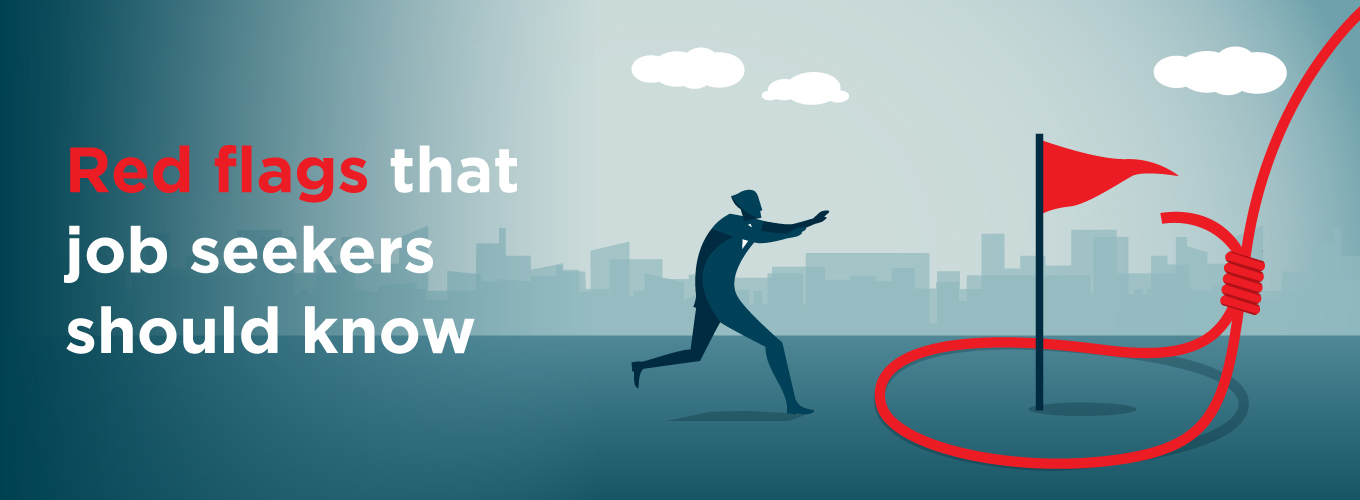We’ve all encountered redflags in different phases of our lives. These are things that go against our values, priorities, and goals. In the employment context, working on a weekend can be a red flag or dress code can be a red flag for others. Some people are conscious about working extra hours without pay. So, priorities vary and red flags differ from person to person.
However, for a job seeker, there are some common red flags that they can watch out for. Like red flags in job descriptions, job postings and application, red flags during the job interview and with job offers. Red flags indicate things that you need to watch out for and give you an idea of what things are likely to be compared to what is apparent at face value.
Red flags in job posting and application
If a job posting has posted salaries with no room for negotiation or flexibility, it is possible that it is a sign of disrespect towards employees. Watch out for salaries that are below market value. Similarly, a job relisted multiple times can indicate a high turnover in the organization.
In job descriptions, watch out for a vague job description. It might indicate that the company is looking for someone to do work outside the scope of the job. Also, if too many requirements are listed, it might be an indicator of no work-life balance in the company. A job description must be detailed enough to establish a career path for you within the organization else it may be an indicator that there is not enough opportunity for growth. Also, when you are looking at job applications, watch out for employee ratings about the company. Read up, research and look at ratings of ex-employees and company reviews. These will help you get a good idea of what it is like to work in the company. Similarly, a complicated application process may indicate that the employer is unreliable or too process-oriented.
Red flags during the interview
A HR person is the face of a company. If you meet a rude HR person, chances are that they will treat all employees the same way. Also, if you find that a manager is not prepared for the interview, there are high chances that they are disorganized leaders. So based on your priorities of working for a good and efficient leader, this may be a red flag to watch out for.
If you feel rushed in an interview, it may be an indicator that the company doesn’t respect you and your time. Or, if you notice that a job is open for a long time, it could mean that either the company has impossibly high standards of work or that they have difficulty in making decisions. If something very lucrative is being offered to you during the interview with no time to evaluate and asking for an immediate confirmation, you need to step back and think whether it is a bait.
During the interview process, clarify what the expectations are for the role. Find out about concrete milestones, ownership of processes and anticipated obstacles. If these are hazy, then you are going to spend a good part of your time defining the job role and not having clear goals.
Red flags in the job offer
A new employer must respect your choice to serve a notice and leave your current job in a professional manner. If they pressure you to leave without notice by giving you lucrative offers, it is a red flag and plain unprofessionalism. You must also ensure that you receive a hard copy of the offer letter before you make a commitment. Check the terms mentioned and take an informed decision. Do not be pressured to accept an offer without a written job offer. Non-negotiable salaries are a sign of disrespect. HR should not be offended or rescind an offer just because a candidate tries to negotiate the salary.
All terms must be outlined in the offer. Especially key details like salary, benefits and other agreed upon perks must be mentioned in a signed letter or formal agreement. This is important because despite all good intentions, sometimes bosses leave and conversations are forgotten. Without a document, you are left with only your wishes.
Look at the termination clauses and performance bonus terms carefully. Sometimes hiring managers make promises that they cannot keep just to entice a candidate. Ensure that everything is put down in writing.
Other red flags
Pulled job offers with no reasonable discussions are the worst. It may show a lack of proper work culture in the organization. Also watch out if the company is skirting any employment regulations. This may be a warning sign that they are unprofessional.
Although the pandemic has changed our relationship with our workspaces, companies that offer gyms, on-site nap-pods, games for you to relax could also be the ones that have poor work-life balance. Some people like to create a personal community in the office but most often this is unnecessary and a job must allow you to pursue what you want to do outside of your work and enable that by giving you enough personal time.
Try and understand the work culture of your future employer. Do some research and see if you will fit in and be in alignment with the work culture there. Even the perfect job can become a nightmare if the work culture is not conducive. Culture is deep-rooted and hard to change. So, ask yourself if you want to work in such a place if you see that the company is bureaucratic or if there is too much micro-management for example.
This is not an exhaustive list of red flags. Each one of us has to develop a way of finding out what will work and what won’t based on our individual priorities. Pay attention to all signs, both positive and potentially negative. You need to be aware of what you are signing up for before it is too late.









